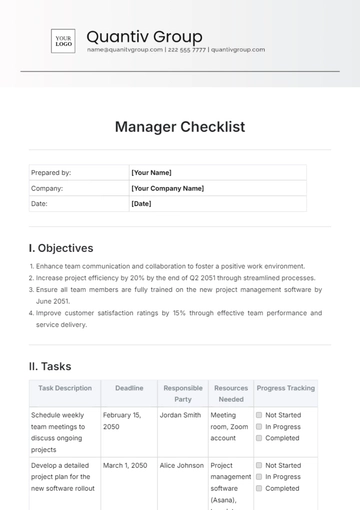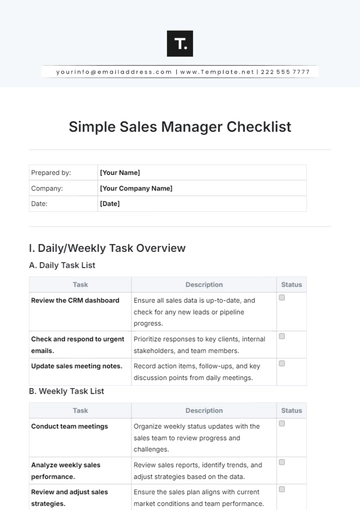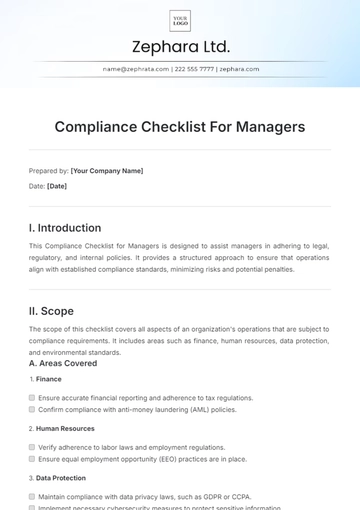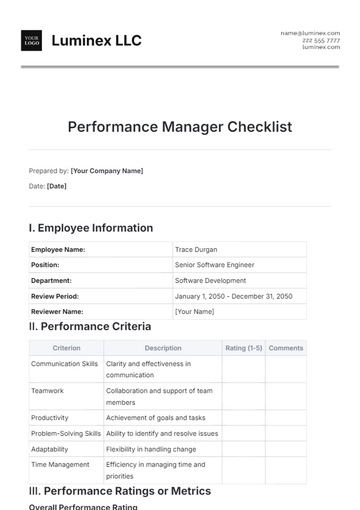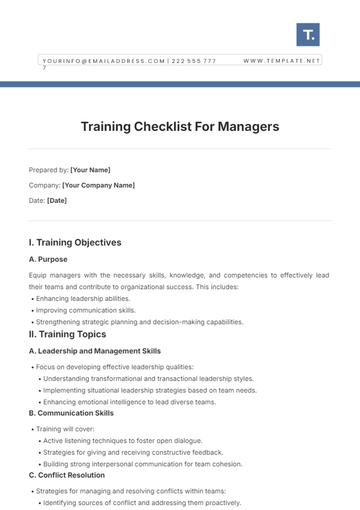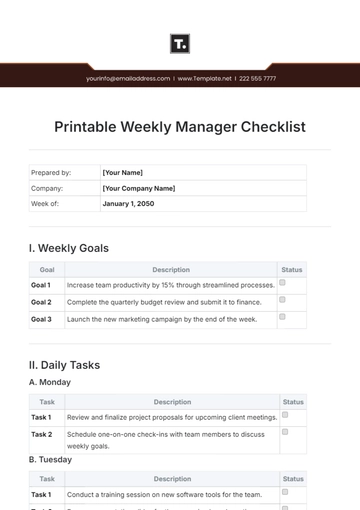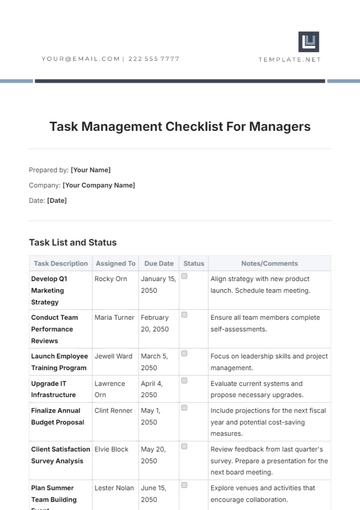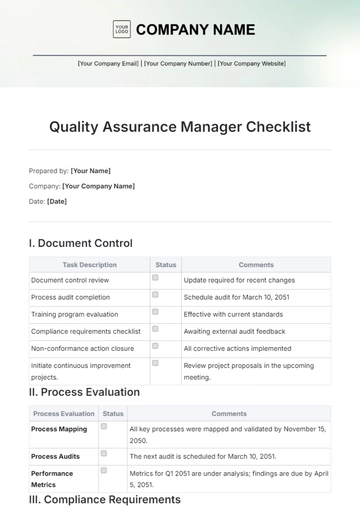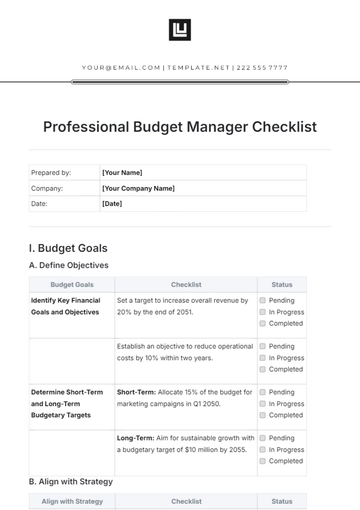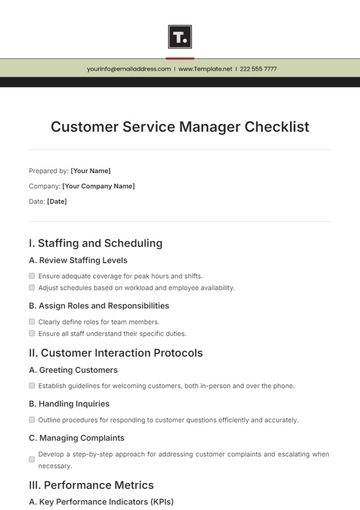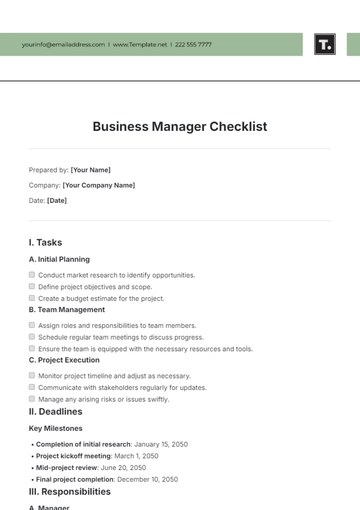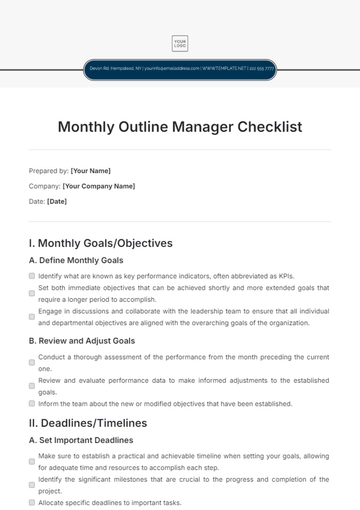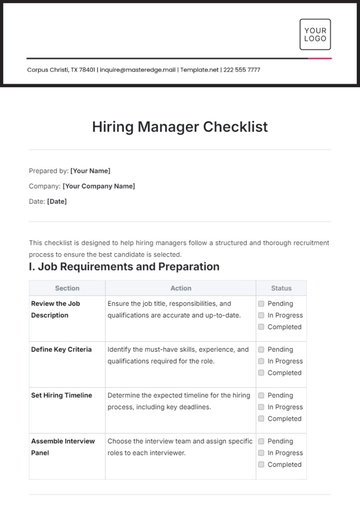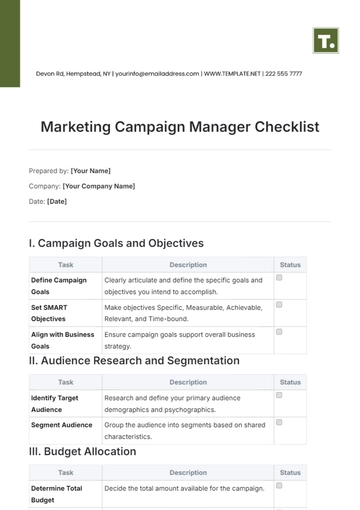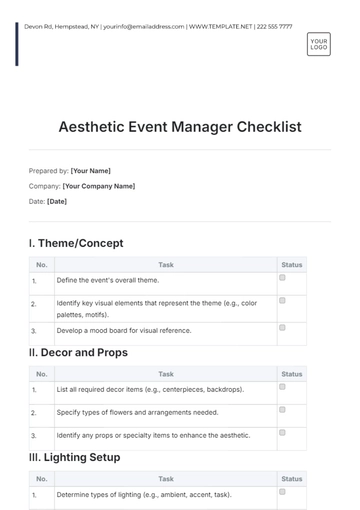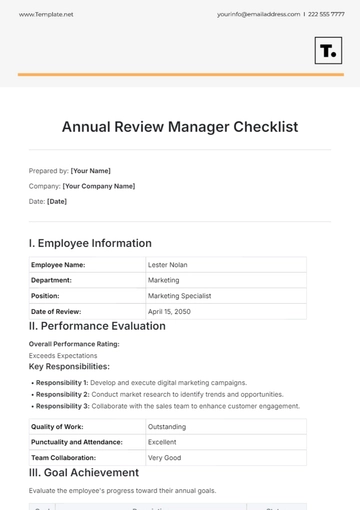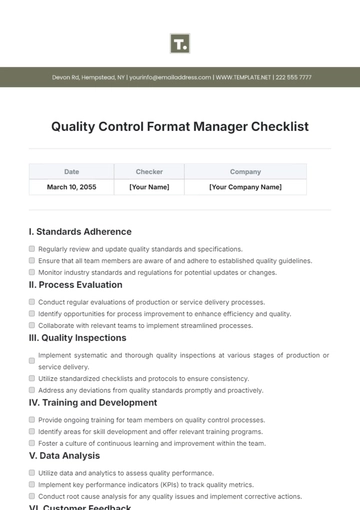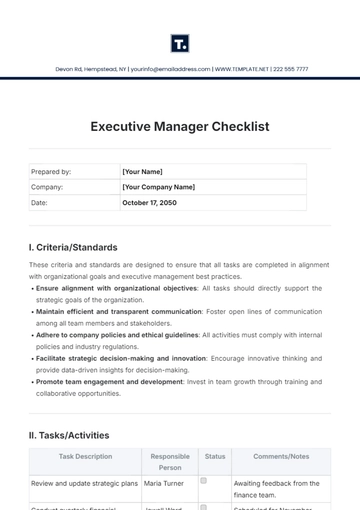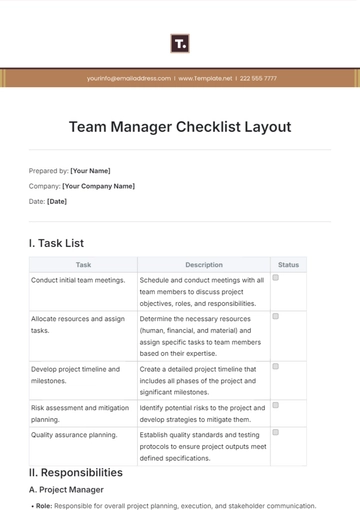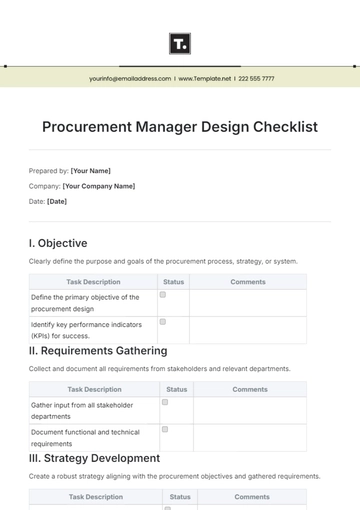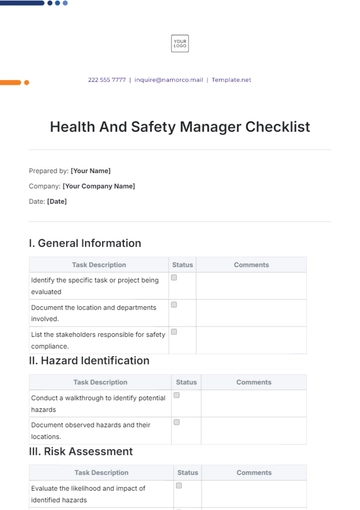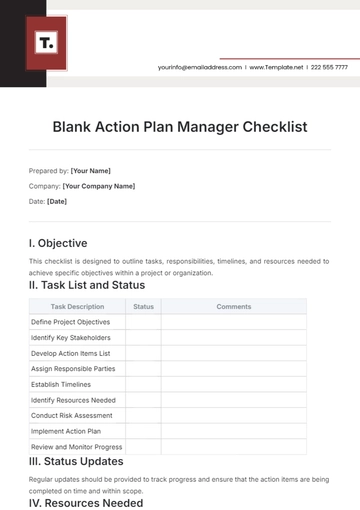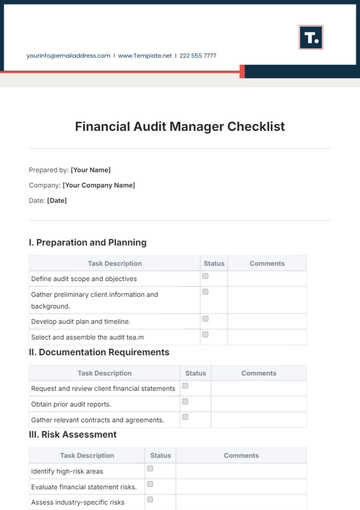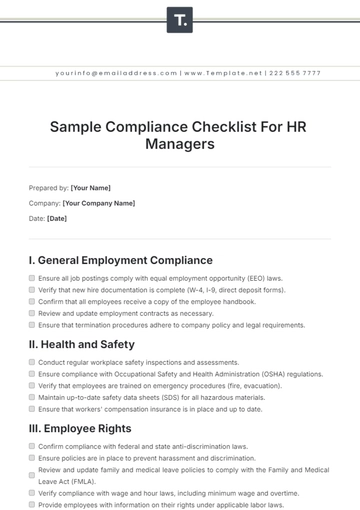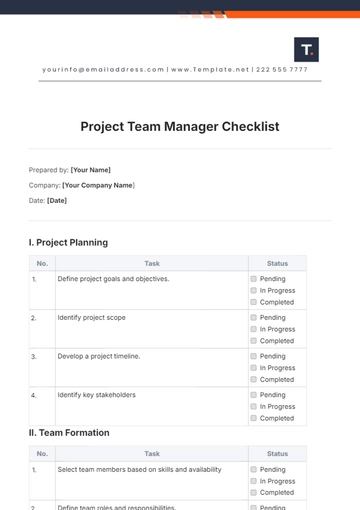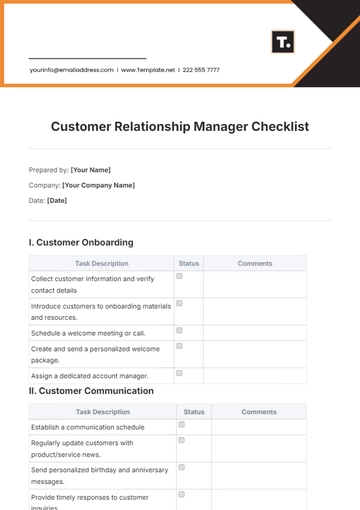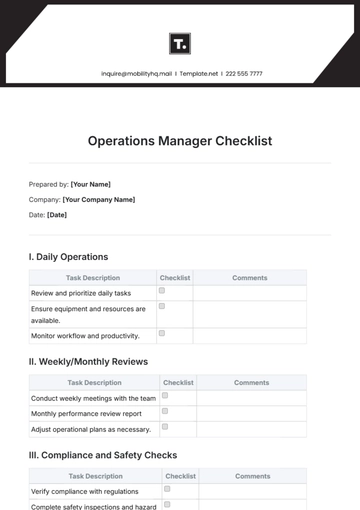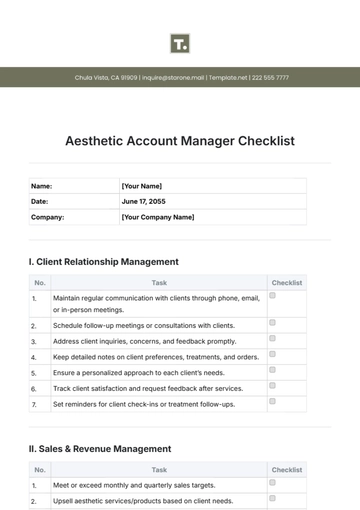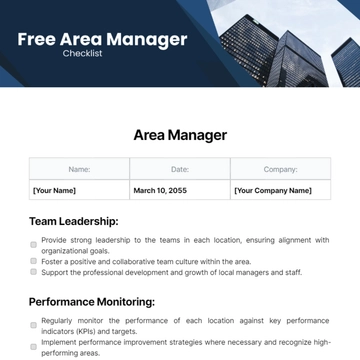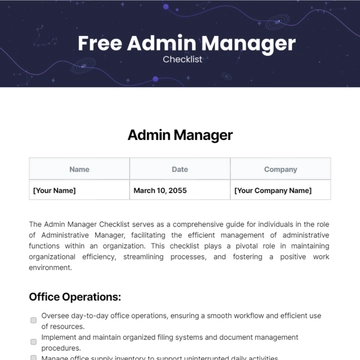Free Area Manager Checklist
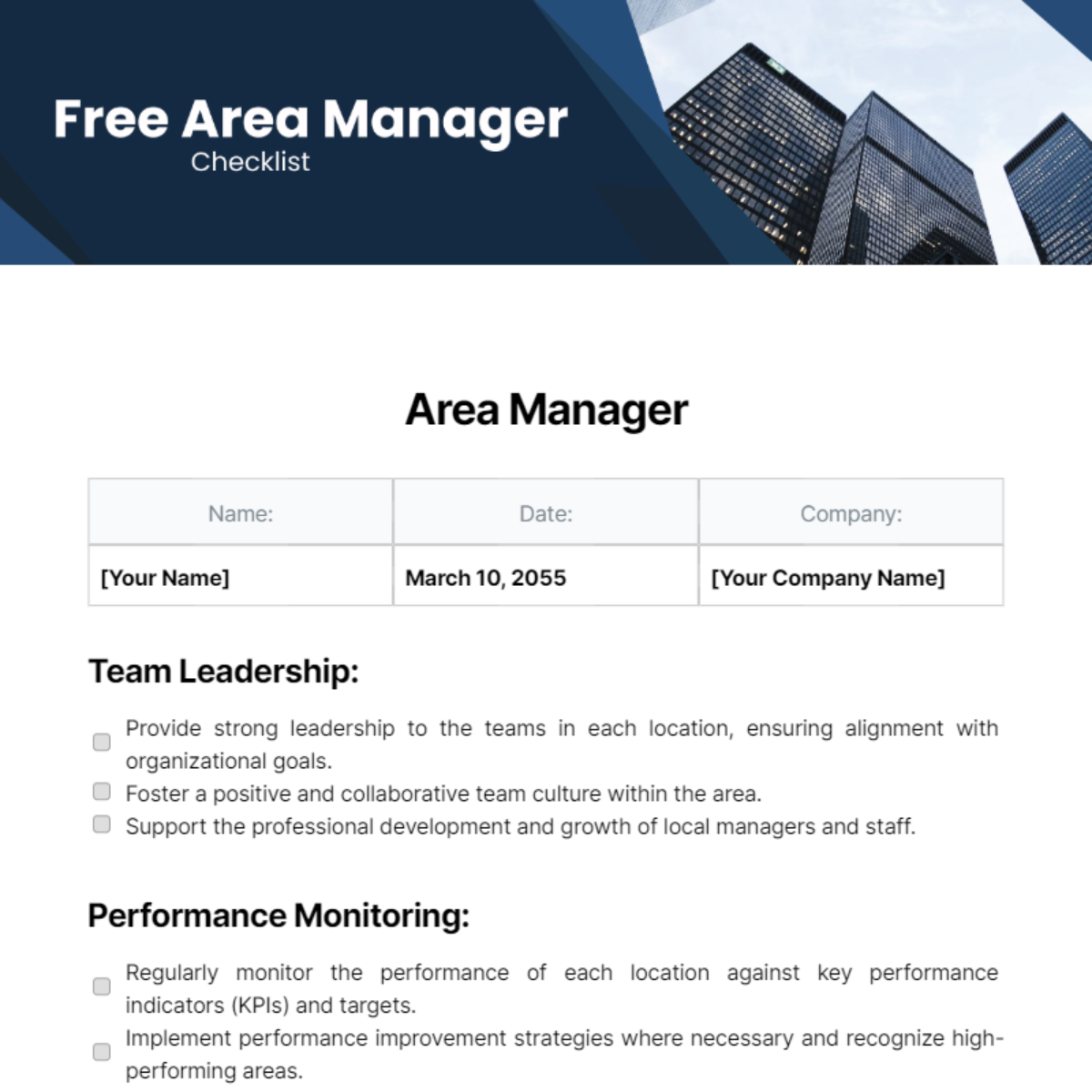
Name: | Date: | Company: |
|---|---|---|
[Your Name] | March 10, 2055 | [Your Company Name] |
Team Leadership:
Provide strong leadership to the teams in each location, ensuring alignment with organizational goals.
Foster a positive and collaborative team culture within the area.
Support the professional development and growth of local managers and staff.
Performance Monitoring:
Regularly monitor the performance of each location against key performance indicators (KPIs) and targets.
Implement performance improvement strategies where necessary and recognize high-performing areas.
Analyze data to identify trends and opportunities for operational enhancements.
Communication Channels:
Establish clear communication channels between headquarters and individual locations.
Facilitate regular meetings and updates to ensure consistent communication flow.
Encourage open dialogue for sharing insights, challenges, and best practices among locations.
Operational Excellence:
Ensure standardized operational processes and procedures across all locations.
Implement best practices to enhance efficiency and customer service.
Conduct regular audits to maintain high-quality standards in each area.
Financial Oversight:
Monitor financial performance and budget adherence for each location.
Collaborate with finance teams to analyze financial reports and address any variances.
Implement cost-control measures to optimize profitability.
Customer Satisfaction:
Prioritize customer satisfaction by ensuring consistent service quality across all locations.
Implement customer feedback mechanisms and analyze data for actionable insights.
Address customer concerns promptly and implement improvements based on feedback.
Inventory and Supply Chain Management:
Oversee inventory levels and supply chain logistics for each location.
Implement efficient inventory management systems to minimize shortages and excess stock.
Collaborate with suppliers to negotiate favorable terms and ensure timely deliveries.
Regulatory Compliance:
Ensure compliance with local, state, and federal regulations across all areas.
Stay updated on changes in regulatory requirements and implement necessary adjustments.
Conduct regular compliance audits to mitigate legal risks.
Market Analysis:
Conduct market analysis to identify trends, competition, and opportunities.
Adapt strategies based on market dynamics and local consumer preferences.
Collaborate with marketing teams to tailor promotional activities to specific areas.
Training and Development:
Implement training programs to enhance the skills and knowledge of local managers and staff.
Provide resources and support for ongoing professional development.
Foster a culture of continuous learning and improvement within each location.
Emergency Preparedness:
Develop and implement emergency response plans for each area.
Conduct regular training sessions on safety and emergency protocols.
Ensure each location is well-equipped to handle unforeseen circumstances.
Community Engagement:
Foster positive relationships with local communities and stakeholders.
Support community initiatives and participate in local events.
Position the business as a responsible and engaged member of each community.
Reporting and Analysis:
Establish a robust reporting system to track key metrics and performance indicators.
Analyze data to identify trends, successes, and areas for improvement.
Provide detailed reports to senior management for strategic decision-making.
- 100% Customizable, free editor
- Access 1 Million+ Templates, photo’s & graphics
- Download or share as a template
- Click and replace photos, graphics, text, backgrounds
- Resize, crop, AI write & more
- Access advanced editor
Efficiently streamline your management tasks with Template.net's Area Manager Checklist Template. This easily editable and customizable tool is designed to enhance organization and productivity. Conveniently accessible and modifiable in our Ai Editor Tool, it's the perfect solution for meticulous area management. Upgrade your managerial approach with this innovative template.
You may also like
- Cleaning Checklist
- Daily Checklist
- Travel Checklist
- Self Care Checklist
- Risk Assessment Checklist
- Onboarding Checklist
- Quality Checklist
- Compliance Checklist
- Audit Checklist
- Registry Checklist
- HR Checklist
- Restaurant Checklist
- Checklist Layout
- Creative Checklist
- Sales Checklist
- Construction Checklist
- Task Checklist
- Professional Checklist
- Hotel Checklist
- Employee Checklist
- Moving Checklist
- Marketing Checklist
- Accounting Checklist
- Camping Checklist
- Packing Checklist
- Real Estate Checklist
- Cleaning Checklist Service
- New Employee Checklist
- Food Checklist
- Home Inspection Checklist
- Advertising Checklist
- Event Checklist
- SEO Checklist
- Assessment Checklist
- Inspection Checklist
- Baby Registry Checklist
- Induction Checklist
- Employee Training Checklist
- Medical Checklist
- Safety Checklist
- Site Checklist
- Job Checklist
- Service Checklist
- Nanny Checklist
- Building Checklist
- Work Checklist
- Office Checklist
- Training Checklist
- Website Checklist
- IT and Software Checklist
- Performance Checklist
- Project Checklist
- Startup Checklist
- Education Checklist
- Home Checklist
- School Checklist
- Maintenance Checklist
- Planning Checklist
- Manager Checklist
- Wedding Checklist
- Vehicle Checklist
- Travel Agency Checklist
- Vehicle Inspection Checklist
- Interior Design Checklist
- Backpacking Checklist
- Business Checklist
- Legal Checklist
- Nursing Home Checklist
- Weekly Checklist
- Recruitment Checklist
- Salon Checklist
- Baby Checklist
- Equipment Checklist
- Trade Show Checklist
- Party Checklist
- Hospital Bag Checklist
- Evaluation Checklist
- Agency Checklist
- First Apartment Checklist
- Hiring Checklist
- Opening Checklist
- Small Business Checklist
- Rental Checklist
- College Dorm Checklist
- New Puppy Checklist
- University Checklist
- Building Maintenance Checklist
- Work From Home Checklist
- Student Checklist
- Application Checklist
